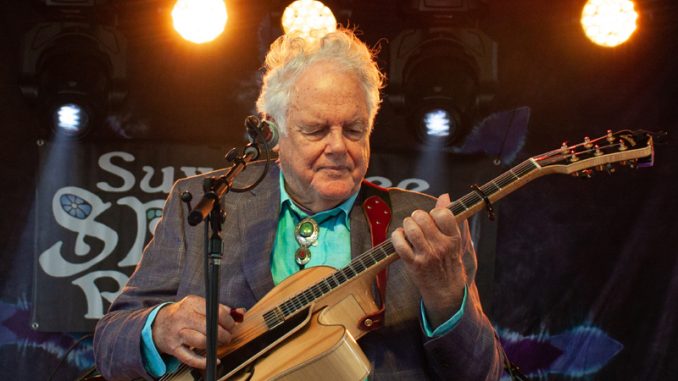
We’re always up for something new at AUK and when we were offered this intimate glimpse into what appears to be an idyllic bluegrass festival, held in the Suwanee Music Park in North Florida, we thought, why not. That it features one of the major figures in bluegrass, Peter Rowan, was of course a consideration. Our author, Mike Fiorito, not only gets up close to Rowan but delves into some fascinating history (in what might be our most name dropped feature ever) when he talks with Verlon Thompson, a long time associate of Guy Clark, and with the Rev. Jeff Mosier, the jamband man and hesitant cleric. Consider this as our take on the late Alistair Cooke’s Letter From America (if Cooke was into banjos) and if you want to see Rowan in action, click on the hyperlinks as this is as interactive as we’ve ever been.
This March I went to the Suwannee Spring Reunion to write about the event and talk to a few musicians. As it turns out, I arrived in Jacksonville, Florida, late on Friday, the 18th, at about the same time as Peter Rowan. Both of our flights were delayed – so I missed the whole Friday-night show. I was flying in from NYC and Peter was coming in from Texas. We’d been in touch through our mutual friend Frank Serio, longtime photographer for the Suwannee Spring Reunion and other events. After getting a call from Peter as I was driving to Live Oak from Jacksonville, Peter, Frank and I met that night and chatted about Peter’s upcoming album, ‘Calling You From My Mountain’, and life in general.
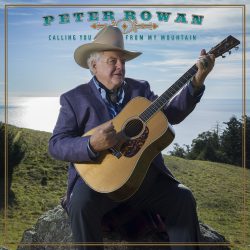
The next day, Peter, Frank and I drove to Spirit of the Suwannee Music Park, where the Spring Reunion is held. (My wife, Arielle, and my son, Travis, were travelling with me.) What was great about arriving at the check-in with Peter is that we received the “bluegrass rock star” treatment. The staff was very helpful, and, with Peter’s blessing, we obtained our badges swiftly and without issue. Checking in, I also got to meet singer-songwriter Verlon Thompson, who co-wrote songs with Guy Clark and was his guitar player. Verlon was invited to play with Clark many years ago and has since become a fixture at the event.
Making our way into the park the next day, I was immediately struck by the beauty of the place: majestic cypresses and oaks draped with Spanish moss and swaying in the breeze. Ducks, white pelicans, purple gallinules, egrets, herons and other wading birds can be seen in and near the park. The Suwannee Spring Reunion has been going on for over twenty-five years. Many people know each other, which is why, I guess, they call it a reunion. There is an air of joy and familiarity about the whole thing. People come together for one reason: to listen to fantastic music acts in a beautiful environment. There were all kinds of people at the event: older people, younger people, families, hippies, Deadheads, men, women, and children.
Peter Rowan
Saturday afternoon, Peter opened his set with a bluesy version of Lightnin’ Hopkins’s ‘Penitentiary Blues’. While there is a bluegrass version of ‘Penitentiary Blues’ on ‘Calling You From My Mountain’, Peter played the live version, using a thumb pick on his Eastman electric guitar, more in Lightnin’ Hopkins’s style. Being a long-time player at the Suwannee Spring Reunion, Peter had a great rapport with the audience, making jokes in between songs, and asking for requests. And the audience responded with cheers and shouts. It was like a homecoming. Peter then played a rendition of ‘Restless Grave‘ from his ‘Dharma Blues’ album. On the album version, there is a lot of lush accompaniment, not to mention Gillian Welch’s background vocals, but Peter’s solo live version was perfect. The absence of background musicians wasn’t noticeable to me.
As requested by me, Peter played ‘Free Mexican Airforce‘. As you’ll see in the video clip, Peter anointed one of the audience members as inventor of a new dance for bouncing along to the rhythm of ‘Free Mexican Airforce’. Once Peter called this out to the audience, the entire crowd emulated the dancing style. We were all cheering and dancing at this point. Peter then dedicated ‘She Moved Through the Fair‘, as requested by Frank Serio, to Sue Cunningham, a fabulous fiddle player who played with Peter, Vassar Clements, Verlon Thompson, the Rowan Brothers and other players.
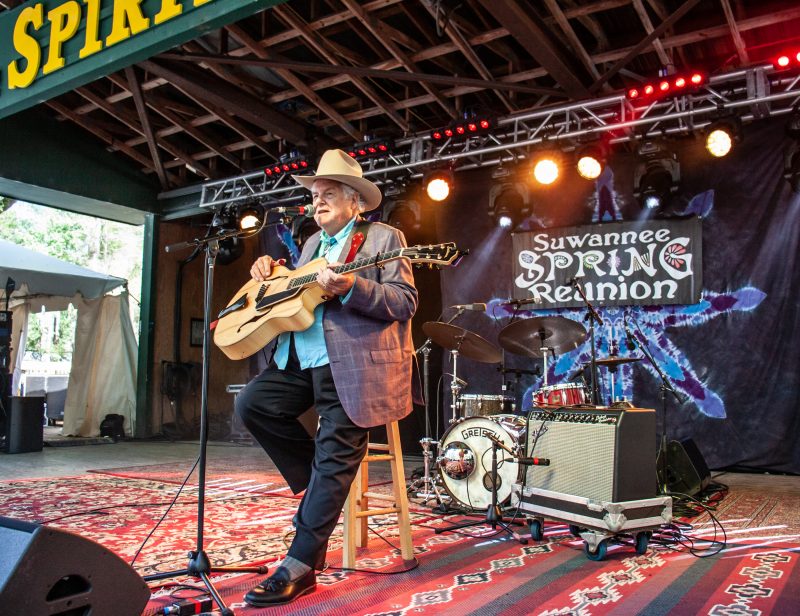
Sparkling with talents like Billy Strings, Shawn Camp, Molly Tuttle, Lindsay Lou and Mark Howard, Peter’s new album also features his own band of extraordinary young players like Christopher Henry (mandolin), Max Wareham (banjo), Julian Pinelli (fiddle) and Eric Thorin (acoustic bass). “I’ve got a young band, it’s fabulous,” Peter has said. “They’re bursting with ideas. They’re in their years of inspiration. They’re really quick learners and their ears are wide open because this generation is built on everything we did, dare I say, all those years ago.”
As Christopher Henry said, “I was stoked for him to help me explore the high tenor harmony on ‘Veil of Deja Blue’ and was tickled that he wanted to include Bill Monroe’s‘ ‘Frog on the Lily Pad’ as a mandolin feature.” Christopher added, “Although it is no real surprise, it is still remarkable that Peter continues to break new ground in traditional and progressive bluegrass music, always being careful to deliver the singing in a heartfelt, emotive way. The guests he picked for the album are brilliant and merge with the core band in a very complementary way and everyone has shining moments. His poetic elegance and lyrical/melodic power on a ‘Winning Hand’ brought me to tears with its charming hint of the Old World, and ‘Freedom Trilogy’ featuring Billy Strings is, well, epic!”
For more information go to: https://peter-rowan.com/
Verlon Thompson
Later that day, I sat down with Verlon Thompson in the hotel’s business room. Let me just say that Verlon is one of the nicest guys I’ve ever met. Verlon’s compositions have been recorded by Jimmy Buffett and Alan Jackson, Dierks Bentley, Anne Murray, The Nitty Gritty Dirt Band, Kenny Rogers, Randy Travis, Del McCoury, Sam Bush, Trisha Yearwood and many more. Verlon co-produced Guy Clark’s Grammy nominated album ‘Cold Dog Soup’, as well as ‘The Dark’, ‘Workbench Songs’ and ‘Somedays the Song Writes You’. Equally important in his songwriting and live performances, Verlon’s guitar work cannot go unnoticed. His guitar can be heard on recordings by Restless Heart, Pam Tillis and many more, including, and especially, Guy Clark. Verlon contributed to the score of the Tamara Saviano documentary ‘Without Getting Killed or Caught’, the story of Guy and Susanna Clark and Townes Van Zandt.
Sitting down and talking to Verlon it was like I’d known him for years. Despite his impressive résumé, Verlon was easygoing, engaging and a delight to talk to. I asked him where he learned how to play guitar, given the variety of styles and influences. I said that I could hear Merle Travis, Jerry Reed, Flamenco styling and more.
“It’s an odd blend,” said Verlon. “A blend of all of that. I started out flat-picking, then I went to bare fingerpicking, James Taylor style playing. I then started to meld in Jerry Reed techniques in my playing. And then, for a while I got a thumb pick, so I was doing Merle Travis kind of playing. Over the years it’s become a hodgepodge of all the above. I hold the flat pick here and I use the other three fingers to pick.”
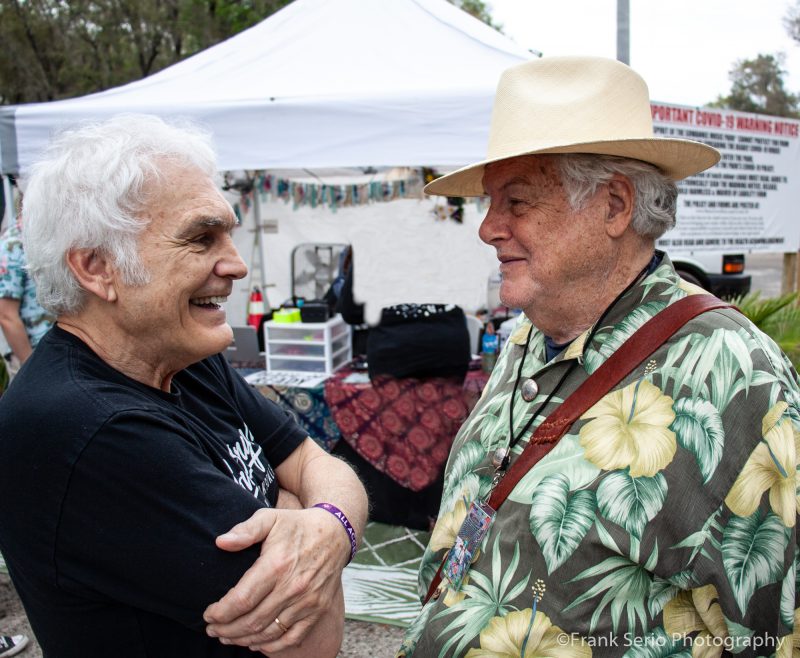
I can tell you that I’ve seen this playing up close. It’s dazzling. This hybrid style allows a picker to use cross-picking techniques with a pick, while also using the fingers to add harmonies and licks. I had seen Verlon play a version of ‘The Guitar’ on Saturday afternoon at the Suwannee Spring Reunion that made the crowd jump to their feet. Not just a great guitar player, Verlon is a teller of tales. All his songs tell stories. Verlon performed ‘I Love You More Than Anything’, which was co-written with Frank Serio in memory of Sue Cunningham. He had to stop at one point as he was getting choked up. The entire audience was silenced by the beauty of the song. Verlon then played ‘Adalee’, which was also co-written with Frank. At this point, my eyes were welled up with tears.
When I told Verlon that Guy Clark called him one of the best guitar players he ever played with, Verlon responded, “I can’t believe he said that. Because when I played with Guy all those years, I played as little as possible. I mean I played only when Guy wasn’t singing and there was a need for it. I don’t do any unnecessary noodling or fills. I laid in there with him on the rhythm parts. He tended to float around the beat, maybe drop a bar every now and then, or something. So, I basically tried to hold that line and then, when it was time for me, I would play. I certainly never played any involved or acrobatic stuff with him at all. That’s what he considered a great guitar player: someone who knew how to stay out of the way!”
I mentioned that Verlon also wrote a lot of the tunes with Clark; he wasn’t just his guitar player. “I realized early on that his songs can stand alone. He didn’t need me up there. He felt comfortable having me there. He knew I was always ready. If he threw it to me, I could carry us onto the next adventure. I learned a lot from him by not playing. I learned more by not playing, instead of playing every lick I knew.”
I asked Verlon how he started writing songs. “My earliest influences when I was a kid, we didn’t have that much to listen to, a couple of AM stations in western Oklahoma. It turns out that they were playing Merle Haggard, who’s a storyteller. Stories of the common man. Then they’d play Roger Miller, who was raised twenty-five miles up the road from me. He also wrote stories of the common man. And then there were others. I could turn my ear in any direction in western Oklahoma. From the west I could hear Roger Miller. I turn my ear to the north, towards Tulsa, I could hear Leon Russell and J.J. Cale. I turn my ear to the east, I could hear Jimmy Webb, writing ‘Wichita Lineman’. It settled into my soul. This is what you do, you write stories about life. I never really thought much about it. I just did it. Then, when I came to Nashville, I didn’t even know songwriters get paid. I met a guy in Nashville who said, ‘Did you know they pay guys just to sit around and write songs?’ That’s what I did for a while. Like twenty years or more. I had songs on the radio. I had big stars doing my songs. I enjoyed it. But when I went out to play, I didn’t play those songs I wrote for other people. They didn’t mean the same thing to me as the songs I played.”
I then asked Verlon about his collaborations with Sue Cunningham. For many years, Sue had been the Fiddle Queen at the Suwannee and other festivals. Sue was loved by all. Before she passed away in 2015, at only fifty-seven years old, she’d played with Peter Rowan, Verlon Thompson, Rev. Jeff Mosier, and a list of other luminaries, like Vassar Clements. I’d listened to the album ‘Find Your Angel’, which features songs written by Verlon, Sue and Frank Serio. The songs are beautiful and direct. You’re hearing what they played and sang, as if they were sitting in your living room. The song, ‘Find Your Angel’ is about a courageous young woman from Vicksburg, Mississippi, and her life before, during and after the Civil War. The album was written as a kind of operetta. The last track, ‘Lorena’, features singing by Verlon and Sue, with Frank faintly in the background.
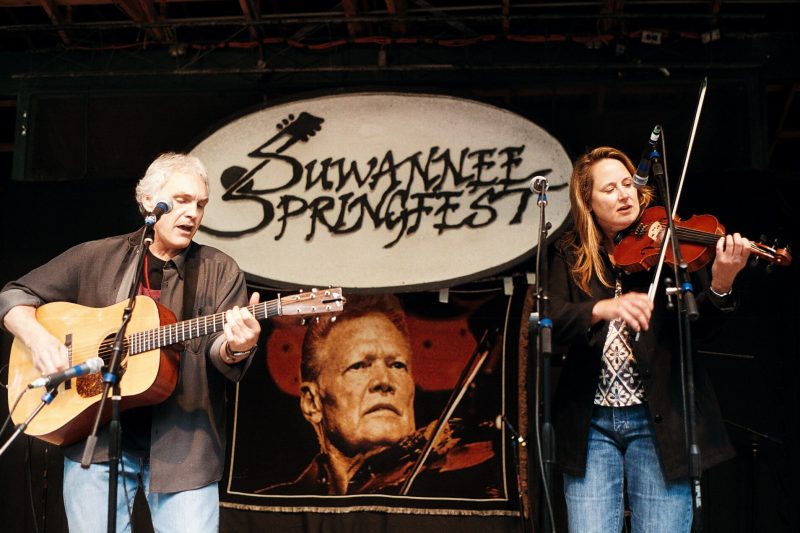
“Sue was precise and focused. But did everything with a smile on her face and made it look easy and joyful. Frank and I have talked about it a million times. The way she’d organize an entire festival. Not only the backstage stuff, but her set with the other musicians. You never saw her look frazzled or worried. There was just this smile. And that’s the way she played the fiddle. It was focused but at the same time it was free as a bird. Back to the songwriting. Frank had said that Sue had not yet written much to date at that time. But Sue was willing to wait and do the search for inspiration. We got so excited writing some of that stuff. There’s a tendency to accept some of the material just to keep moving. I would say, ‘Guys, I’m sorry but it’s not there yet.’ But Sue always got that. She had a real gift and she used it, as much as she could in all of the right ways.”
I said Sue had that Richard Greene ability to combine Paganini-like precision and could incorporate tears into her playing. You can’t teach the tears, I said. “Oh man, I like that, you can’t teach the tears,” replied Verlon. “It’s an extension of your soul. That’s why she and Vassar hit it off. He was playing from the bottom of his soul and then Sue stepped up and did the same thing. They just clicked.”
When I asked Verlon what the Suwannee Spring Reunion meant to him, he said, “I slipped in here playing with Guy Clark. And I said, this happens? Randy and Beth Judy have been with me through divorces when I broke both my arms. We’ve lived a lot of life together. It’s not like I’m putting on a show, it’s like I’m here with family. And I’ve seen them lose loved ones. Most of the folks you see coming, they come every chance they can get. It’s all about peace and understanding. That’s what Beth Judy has promoted. It’s what she likes to say, ‘festive-heart.’ The Suwannee has meant the world to me.”
For more information go to: https://www.verlonthompson.com/
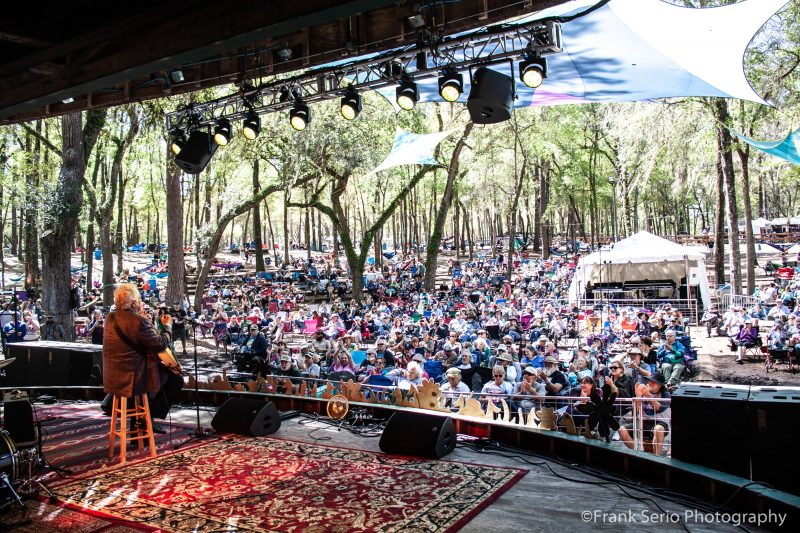
Rev. Jeff Mosier
Scruggs-style banjo picker “The Rev” Jeff Mosier, one of the earliest music pioneers who merged bluegrass instruments and traditional tunes with the magnetic energy of rock and roll, founded the jamgrass band Blueground Undergrass (BGUG) in 1998 after years of crafting his banjo skills in various bands, playing everything from bluegrass (Good Medicine, with his brother Johnny) to experimental rock (Col. Bruce Hampton and the Aquarium Rescue Unit) to jazz-fusion (The Ear Reverents). Blueground Undergrass, the band he fronted for more than a decade, recorded four albums and built a sizeable national following by combining bluegrass purism with a jam-band sensibility. Later, as the jam-band scene became more jam-tronica and less roots-driven, he formed a more song-driven rock/bluegrass ensemble, The Mosier Brothers Band, performing at festivals, theatres and private events throughout the region. Having shared the stage with such legends as Peter Rowan, Vassar Clements, Col. Bruce Hampton, Phish, Leftover Salmon and Widespread Panic, Jeff has always been a versatile artist who is as comfortable performing on a stage full of musicians as he is playing solo.
It must be something in the air at the Suwannee Spring Reunion. The performers who I talked to were accessible, kind and good humoured. Jeff took a picture of me and my family with Peter Rowan, and afterwards I asked him if we could connect for a brief interview.
How did you acquire the title Rev. Jeff?
“It’s a notion that Bruce Hampton had when I was in the Aquarium Rescue Unit. Bruce named me Reverend Mosier from the hills of Tennessee. Then Phish put me in their book under that name. So, when I started Blueground Undergrass in ’98, people would ask, You’re the Reverend Jeff Mosier? I got my biggest exposure from that. Now that Bruce is gone, I’m trying to shake it. I have a lot of post-traumatic religious disorder because of the way I grew up, and then those I’ve watched, the moral majority and all this stuff roll along throughout my childhood and come to full, you know, fruition at this point in our country, right? It’s a mixed bag. If it opens doors, I can put a comedic spin on it. And use it to my advantage with good intentions. But I don’t feel revered. I have to go with it because it’s out there and it’s too late. Heck, I’m sixty-three! A lot of hippies hang together and talk. It’s a tight community and beautiful people. That’s a long answer, but that’s what happened. I’ve dropped bombs on Facebook a lot of times. Asking rhetorical questions. They don’t have to have answers, but I think asking questions is as important as anything in life. A lot of people write to me for some reason. I don’t know why, but they’ll write to me and ask, What do you think about this thing that’s going on in my life or whatever? I’m kind of a psychospiritual consultant. And then of course, I’ve married a lot of couples. And they come to me. I don’t pursue any of these things. They come to me and want me to marry them because they’re hippies. They don’t really know preachers, and so they hear that I’m a preacher. I do a little interview with them and I asked them a few questions. I just married John Mailander who plays with Bruce Hornsby. And he also recorded with Billy Strings on his last record. John’s a good friend of mine. Just married him and his wife here, here in my living room. That was my last wedding. I mean, I guess maybe if I think about it, having the Reverend title has brought some good things. Beautiful moments too. And then I do a lot of bedsides. I talk to people and play banjo by their side while they’re dying. So that’s why I’m careful not to make fun of it or play it down because I am a spiritual person, but I’m not associated with any large belief system at all.
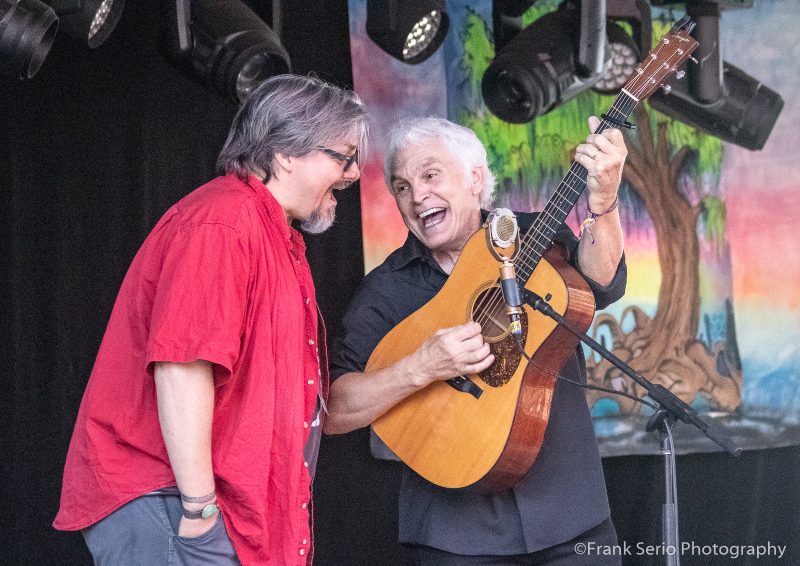
How would you describe your music?
I got into music through bluegrass. I’m from Bristol, Tennessee. The real story is that my grandmother influenced me and my brother. And then we moved to Atlanta. I was ten, he was six. We were Tennessee hillbillies and suddenly we’re in a big city. Then we were exposed to all kinds of new music. I started my radio show on WRFG 89.3 FM in ’84. My show was called Born in a Barn; it was mostly bluegrass. But then I began to play other music: Nancy Griffith, Peter Rowan and Old & In the Way. I wasn’t a hippie; I didn’t even have a pair of Birkenstocks. I was just a bluegrass guy. But I was listening to music outside the bluegrass box, so when I put on ‘Land of the Navajo’, man, the hippies would start calling. I was there for fourteen years. I also interviewed people. You know, a lot of people, a lot of famous musicians, like Tony Rice. You know, a lot of different people. And then it was a popular show. See, I was really wanting to be a player. And I was a player, but I hadn’t reached any kind of audience. I wasn’t in a band that had national recognition until I really met Bruce Hampton. Bruce made me take bluegrass, Grateful Dead, jazz and mix them all together. Bluegrass Underground. Boogie rock, roots rock. Stuff that moves asses. It moves your arms, spreads to your legs and all the sudden you’re dancing. Mostly I play improvisational based music. I like to have a guide, but I don’t plan it to the minute. A few weeks before the Suwannee Spring Reunion this year, Peter Rowan called me and said, “Hey, you want to meander on a set with me Saturday night? We were just gonna get up there and find out what’s there.” Then it gets rained out. My heart was broken. Peter played with the Mosier Brothers at one point – about 2010 to 2012. We were his band for a while.
You play a very unconventional type of banjo.
It’s a banjo called a Crossfire made by Deering. Emily Strayer from the Dixie Chicks and Béla Fleck play one. It doesn’t have a deep chamber and it doesn’t give feedback. Your sound can bleed onstage with a banjo. I bought it in 2005. It serves what I do. I’m a singer-songwriter who happens to play the banjo. I don’t consider myself a great banjo player. But I do know how to lead a band through a weird path. Peter’s the guy who influenced me doing that kind of thing. Sometimes it looks and sounds lost but then the music collapses into place. That’s when people will close their eyes. Then it’s bigger than you. Peter is the master of that. You gotta find the right wrong note is what Bruce Hampton used to say.
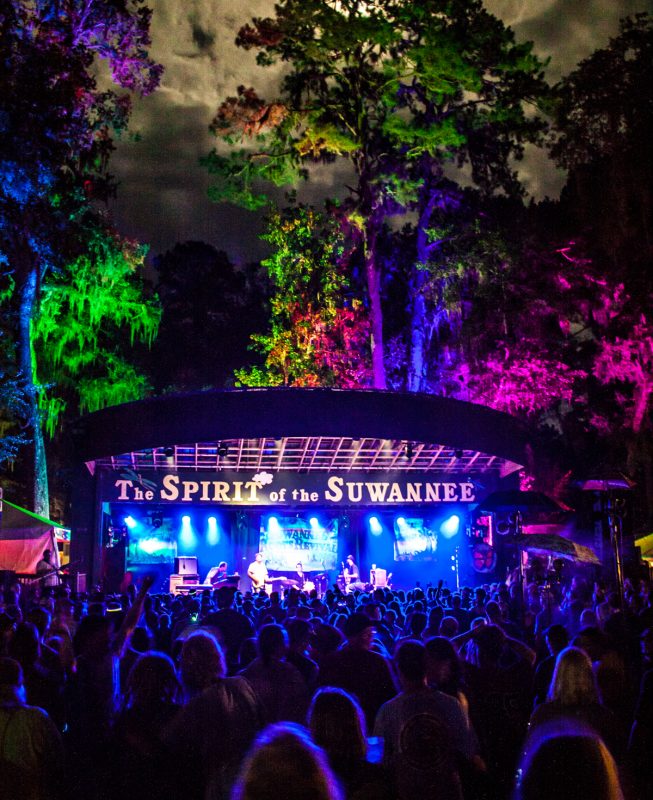
You guys played ‘You Are My Sunshine’ and the whole crowd came alive.
People need it. I was looking out there. They had this look on their face. Everybody had their heart out on their sleeves; it was a tender moment. Remember the guy who played with us in a wheelchair? That was Andy King. He was a bass player. We all love Any King. We’ve watched him fight Parkinson’s for the past many years. Andy represents bravery. Now he can play this harp thing. He switched instruments based on his disability. That was a special moment. I wanted people to see that he’s still here with us. He’s finally gotten down to where he can barely move, but he can still move his fingers. So, he picked the harp.
What are you working on next?
I’m working on my first solo album where I play under my name. I’ve always had this feeling of having a band. But now I’m just wanting to take Peter’s advice. You gotta get to the point that you realize you’re enough, Peter said. My mentor, Bruce Hampton, died on stage at seventy at the Fox Theater. I was there. It took my mojo away for a while. But now I want to communicate hope, peace and allow music to be a healing force and a medicine. I want to entertain, but I also want to give people a chance to be involved, to sing. At the Suwannee Spring Reunion, we have an unspoken agreement that we can be ourselves. They don’t rope off areas, you don’t see security everywhere. They don’t protect us like rock stars and we don’t act like rock stars. My kids grew up there. I want to do an album that reflects that open spiritual thing. It’s my job to use my talent to be a force to pull that gun out of our mouth – to become a viable human species. I will be writing songs about that without it being preachy. Peter Seeger would invite people to sing along. He used his banjo like a magic wand. I want to have that album out by the next Suwannee Spring Reunion. I hope to have John Mailander produce the album. I like to talk about ways of thinking that could be productive. I don’t put myself up as a perfect example. I want whatever I do to be us. I want it to be all of us together. People want to see you sharing from your heart. You don’t catch people’s attention. But some people will sit in a chair and listen to a two-hour performance. To me, that’s transportation. You transport people, it’s transportation. Peter does it so well. Peter’s my hero. That’s what I plan on wanting to do for the remainder of my time on the planet.
For more information go to: https://www.revjeffmosier.com/home
Mike Fiorito is an author and a freelance music reviewer. His book Falling from Trees won the 2022 Independent Press Distinguished Book Award. Mike’s latest book, Mescalito Riding His White Horse, Inspired by the Music of Peter Rowan, will be available for pre-order in August 2022. For more information, please go to: https://mikefiorito.com
Amanda Rowan is an award-winning art director, photographer, curator, and educator. For more information, please go to: https://www.amandarowan.com
Frank Serio is a songwriter and a photographer with over twenty-five years of experience capturing shows and festivals on camera. For more information go to: frankseriophotography.com
For information on Sue Cunningham Music Scholarships, please go to: http://littlehickory.org



Mike, reading this was nearly as good as being at Suwanee itself. Looking forward to your book on Peter Rowan who has been a hero of mine for more years than I care to admit.
Thanks so much Martin!!! Please join our Peter Rowan Appreciation Society page, if you haven’t already. Stay in touch! More to follow.